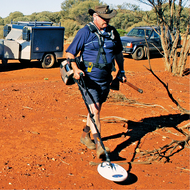Seven Golden Rules campaign targets prospecting safety
| Date: | Friday, 11 May 2018 |
|---|
It doesn't matter how much gold you find, if you get lost in Western Australia’s outback you could lose your life.
That’s the blunt message from the Department of Mines, Industry Regulation and Safety (DMIRS) as the prospecting season gets under way in Western Australia and it launches the annual Seven Golden Rules campaign to promote safe prospecting.
“Sadly, the year started with the death of a novice prospector in the Gascoyne, near Cue, in January and this tragedy is a dramatic reminder of the need for this type of awareness campaign,” DMIRS Resources Tenure Executive Director Tony Bullen said.
The prospector’s body was found after a major two-day search in 45 degree heat only 2.5 km from the 48-year-old man’s campsite.
Mr Bullen is expecting 2018 to be a very busy prospecting season.
“We know that a cool summer and a large amount of Miner’s Rights issued early in the year adds up to a lot of prospectors on the ground and that is how the season is shaping up,” DMIRS Resources Tenure Executive Director Tony Bullen said.
A total of 974 Miner’s Rights have been issued since the start of the year and 537 of those have been issued since the beginning of April.
A Miner’s Right is the most common prospecting permit used by prospectors visiting Western Australia and allows holders to prospect on Crown Land with hand-held tools, such as a metal detector, and to take and keep samples or specimens up to 20 kilograms
“We’re only a few short of last year’s record number of Miner’s Rights, so that is telling us we need to be tenacious in spreading the safety message this year, particularly to the first timers out in the bush this year,” Mr Bullen said.
The first Seven Golden Rules for prospecting campaign in 2014 was in response to a recommendation by the State Coroner for prospectors to carry a Personal Locator Beacon (PLB) following the 2012 death of a prospector near Menzies.
Michael Graham sparked a 15-day search involving aircraft, motorbikes, horses and expert trackers covering 1500 square kilometres.
The body of the 46-year-old father-of-two was never found.
The Coroner’s Court was told that of the nine prospectors who had been reported missing that year, only one had been carrying a PLB and was found within four hours.
Searches for missing prospectors average 11.3 hours but many last one or two days, while aircraft searches cost up to $5000 per hour
“Searches are not only stressful for the family and friends of those lost, they stretch precious police and emergency resources,” Mr Bullen said.
“Western Australia’s outback is a fascinating place, but it can also be a brutal environment and that is why we put the safety first message at the beginning of our Seven Golden Rules.
“And the best way to keep yourself and loved ones safe is to carry a PLB when prospecting in remote areas.”
The device, which can be bought from most outdoor and camping stores, is considered by search and rescue organisations to be ideal for use in remote areas because it does not rely on telecommunication networks to submit a signal.
“If you're not carrying a beacon, you're not taking enough responsibility for your life,” Mr Bullen said.
The Seven Golden Rules for prospecting campaign will target tourist bureaus, libraries, caravan parks and DMIRS offices with posters, brochures and booklets.
For more information about prospecting, please visit your nearest Mining Registrar’s office to obtain a copy of Prospecting in Western Australia or download it from www.dmp.wa.gov.au/prospectingwa
The Seven Golden Rules
1. Put safety first
- Make sure you have enough water, fuel, maps, first aid supplies.
- Give serious consideration to taking some form of telecommunications and a global positioning system to fix locations, and a Personal Location Beacon (PLB) – it may turn out to be your most important safety device.
2. Obtain a Miner’s Right permit
when prospecting on vacant Crown land ($25 from any Mining Registrar’s office).
3. Obtain a 40E permit
when prospecting within an exploration tenement (if you don’t have written permission from the tenement holder),
4. Get written permission
from the tenement holder when prospecting on:
- a mining lease
- an exploration licence (if you don’t have a 40E permit)
- a prospecting licence
5. Comply with all legal requirements
when prospecting on a pastoral lease. This includes gaining permission from the pastoralist for access to certain areas.
6. Show respect when on Crown land
because it is used or set aside for many purposes, including:
- pastoral and grazing activities
- parks and forests
- the use and benefit of Aboriginal people
- mining activities
7. Fill any holes
that you dug and repair ground that has been disturbed.

